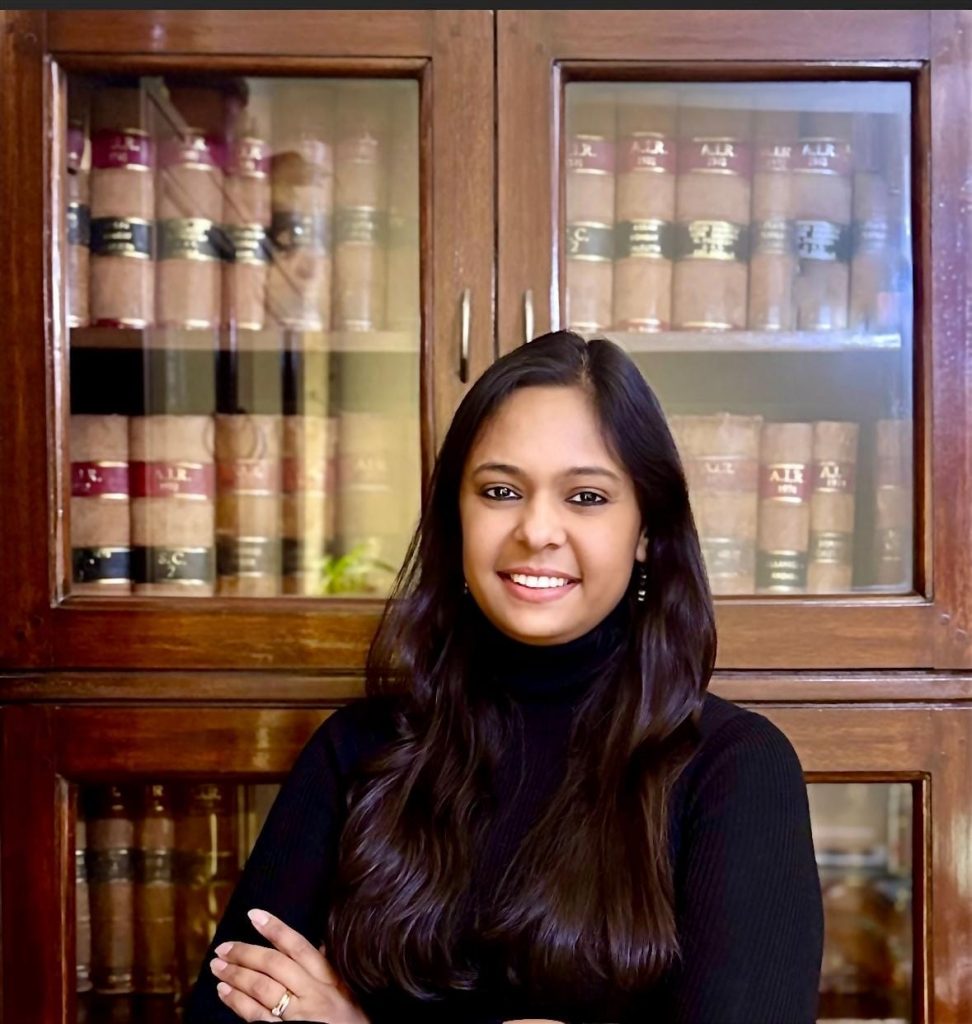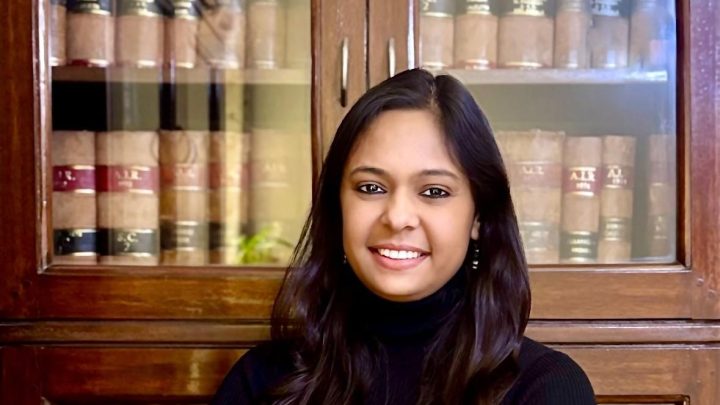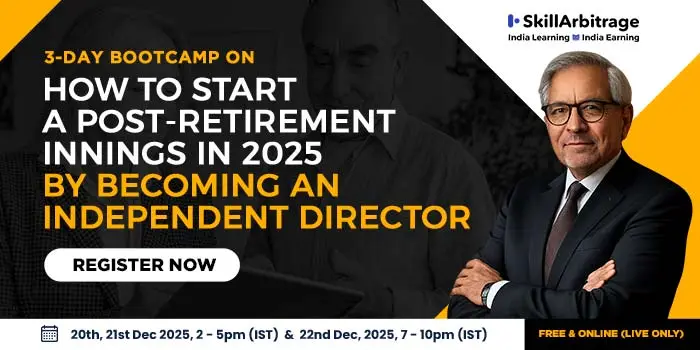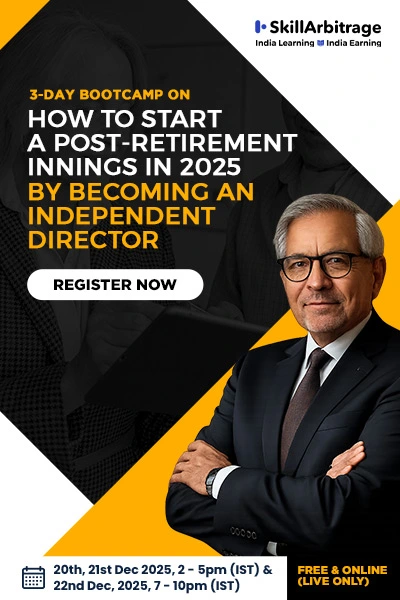AOR
2149
0
0
“I believe an inherent interest and love for the Law, coupled with deep reserves of patience is an absolute essential if choosing to pursue litigation.” – Aditi Tripathi, Advocate-on-Record at Supreme Court of India.
This interview was taken by SuperLawyer Team
Posted on February 27, 2025
This interview has been published by Anshi Mudgal and The SuperLawyer Team

With over a decade of experience now, what initially sparked your interest in pursuing a career in law? Was it a deliberate decision to enter the legal profession, or was there a specific event or experience that inspired you to take this path?
I never had to look for inspiration beyond home. My father, Justice Ajay Kumar Tripathi, was a first generation lawyer, who in turn was encouraged to pursue law by Prof. N. Madhava Menon, the architect of modern legal education in India. Watching my father burning the midnight oil in preparation for matters, and listening to his stories about particularly challenging days in court was always fascinating. Even as a child I could glean that here was a career that encouraged inculcating intelligence, quick thinking, and an ongoing quest for knowledge coupled with an element of public service.
By the time I was at the cusp of entering college, my father was elevated to the bench, which gave me fresh and unprecedented insight into the gruelling demands of the profession, not only as part of the Bar, but even on the Bench. Having an innate inclination towards humanities over the sciences, I loved studying history and political science and ultimately, decided to appear for the law school entrance exams.
During my time at NUJS, Kolkata I endeavoured to gain a broad spectrum including during internships. In my penultimate year of law school my elder sister, also a lawyer, advised that I apply for an internship with Amarchand & Mangaldas & Suresh A. Shroff & Co., New Delhi (now Shardul Amarchand Mangaldas/SAM). I interned with the Litigation and Disputes Resolution practice area at AMSS. I assisted the associates in active matters with research and drafting. It was exciting and challenging, and led me to realise that litigation was my true calling. Having liked my work, AMSS recruited me while I was still in my 5th year.
Having worked with several distinguished legal chambers and law firms, how did these early experiences shape your approach to legal practice? Are there any key lessons or insights that you gained from these experiences that continue to inform your work today?
My litigation journey started with the Litigation and Disputes Resolution Team at AMSS. AMSS is one of India’s top-tier law firms, while you feel fortunate to be a part of the organization, life at a law firm is gruelling. The long hours, in a high pressure environment is ‘baptism by fire.’ However, working at one of the leading law firms of the country, I learnt to emulate the industry’s best. Law firms give you great exposure, both at a professional and personal level. Handling high stakes matters, I inculcated critical thinking, which makes for a good lawyer, and as a solicitor, I also mastered skills like time and client management. The most important skill I imbibed at AMSS was attention to detail. Another learning from Mrs. Pallavi S. Shroff, the Managing Partner was to always be prepared with the brief, even if you are the junior-most lawyer on the matter. She guided young lawyers to learn every aspect of the matter, including the most fundamental things like ensuring no typographical errors, correct pagination of briefs, preparing proper case compilations, and brief management. Even now in the era of digitisation, these skills continue to serve me well and have set high standards for my final work product.
Wanting to be in courts more regularly, I joined the Chambers of Mr. Paras Kuhad, Senior Advocate and Former Additional Solicitor General of India. The experience at a senior’s chamber after a law firm was equally if not more challenging and demanding. The most important insight Mr. Kuhad provided was that as a litigator one has to marshall the facts of a brief. Arguments may be subjective, depending on the side you are defending, but not the facts. In court, I frequently see Judges calling upon young counsels to apprise them on the facts of a petition. Judges are always encouraging of juniors who are well prepared. As a young counsel, to receive a compliment from the court is an unparalleled feeling, and goes a long way in building your confidence. This also instils a sense of ownership towards the brief.
I also had the privilege of being a part of Mr. P.S. Narasimha, Senior Advocate’s chamber (as he then was). While the volume of work made it a high pressure work environment, it was also the most ideal office, with an exceptionally congenial atmosphere. The biggest insight I garnered during my time there was that – with the right attitude and guidance, people thrive and are encouraged to show up and give their 100% every day. As a part of Mr. Narasimha’s office, I worked on matters, which engaged the attention of the nation. Observing Mr. Narasimha, I learnt that keeping your composure, no matter the complexity of the brief, is the touchstone of a good lawyer, and also of a good human being.
Undoubtedly, the common thread running through all the offices I have been a part of is that there is no substitute for hard work in our profession.
After gaining experience with various legal entities, you chose to establish your own practice. What motivated this decision, and what challenges did you face in the early stages of building your independent practice?
While mentorship under a Senior Advocate helps lay the foundation to your foray into the practise, it is still a bubble. I had already received a taste of solicitor practise, and realised I enjoyed being a litigator more. Therefore, instead of going back to a law firm, I dove into the deep end.
I decided to go independent while the world was still overcoming the rigours of the pandemic. It was daunting, and there were difficult days. Work was slow and sporadic. After being accustomed to working at a 100 miles an hour, 7 days a week, for close to a decade, this was a new normal. I had to make peace with a different pace. As a silver lining, I got time to prepare for the Advocates-on-Record Exam, which I cleared in 2022.
The idea is not to get disheartened. Litigation is a patience game, and the patient are surely rewarded. 4 years later, slowly yet steadily, work and clientele has grown, and life has come a full circle. The familiar hectic nature of the practise, 7 days a week is back. I have come to relish it as I now get to work on my own terms.
Being an Advocate on Record, what are some of the most challenging legal issues you have encountered? How do you approach representing the Government in the Supreme Court, and can you share an example of a significant matter you handled for the Union?
The Advocate-on-Record is a bridge between the clients and the court, ensuring compliance with legal formalities and maintaining the integrity of the judicial process. Managing client expectations along with the strict scrutiny from the Court is a fine balance to be struck on a daily basis.
As Panel Counsel for Union of India, the challenge arises from the multifaceted nature of litigation involving the Government of India. Representing the government requires a nuanced understanding of both legal and administrative issues, with the added pressure of ensuring that the legal positions are consistent with existing policy and legislative frameworks. In cases involving matters of national significance — such as land acquisition, criminal laws, or fiscal regulations — the government’s stance must be defended without compromising on constitutional principles. One dons two hats in such cases, i.e., that of a counsel and also an officer of the court. The responsibility and care when drafting on behalf of the government is also greater. This demands an in-depth grasp of public law, detailed preparation, and an ability to respond swiftly to dynamic legal developments in a high-pressure and high-stakes environment.
My approach to high-stakes matters involves meticulous preparation and intelligent strategizing. One has to be ready for all possible questions that fall from the Bench. By being proactive, I work towards achieving favourable outcomes even in the most complex issues and questions of law.
You represent a variety of public-sector organizations. How do the legal challenges differ when representing government-owned entities compared to private clients? What strategies do you employ to address complex issues, particularly when public interest is at stake?
The most significant challenge is striking a balance between the rights of individuals, the existing policy framework and the larger public interest, especially in cases that involve public welfare or environmental protection. In such cases, stakes are often high, and the outcome can have far-reaching consequences. Additionally, interpretation of laws, particularly in unchartered questions of law and in evolving social and political landscapes, add a layer of complexity that requires constant adaptability and precision.
You have represented clients in arbitration cases involving significant monetary stakes. Can you elaborate on your approach to high-stakes arbitration and the strategies you employ to achieve favourable outcomes? Additionally, how do you navigate the complexities of cross-border disputes, especially those involving international arbitration bodies?
In high-stakes arbitration, my approach centres on a deep understanding of the legal nuances, the facts of the case, and the business interests of my clients. With significant monetary stakes involved, my priority is to build a strategy that is both legally sound and strategically astute.
First, I focus on thorough case preparation. This means not only understanding the applicable law in-depth but also conducting a meticulous review of the evidence, the contract terms, and any prior communications that could impact the dispute. I always anticipate potential challenges and prepare pre-emptive responses. At the same time, I try to understand my client’s broader goals—what outcome they are hoping for beyond just the legal victory—and this informs how I present the case.
A key part of my strategy is identifying and leveraging early opportunities for settlement or negotiation. Arbitration, while a powerful tool, can be a time-consuming and costly process. If we can settle on favourable terms, I pursue that route, ensuring my client secures a win without unnecessary delays. I assisted Mr. Narasimha in drafting the Mediation Bill under the aegis of the Supreme Court Mediation and Conciliation Project Committee. In the course of the same, I realised the merits of Mediation in assisting clients finding speedy resolutions to their disputes, while the courts grapple with pendency. However, when arbitration is the only viable option, I embrace it fully and leave no stone unturned in presenting the case at its strongest.
In terms of navigating the complexities of cross-border disputes, especially involving international arbitration bodies, I recognize that each jurisdiction has its own unique set of rules and procedural nuances. My approach to cross-border disputes is based on a clear understanding of both the international arbitration framework and the local legal systems at play. This includes knowing the procedural rules of the institution governing the arbitration, anticipating enforcement challenges, and managing any potential jurisdictional issues that arise.
International arbitration requires a blend of legal expertise and global perspective. I pay careful attention to jurisdictional choices, as these can have a profound impact on the outcome. A robust understanding of public international law, private international law, and the evolving trends in international dispute resolution ensures that I can effectively navigate the complexities of cross-border disputes and craft arguments that resonate with international tribunals.
Finally, I focus on maintaining effective communication with all stakeholders involved, including clients, opposing counsel, and arbitrators. Building trust and confidence in my representation is critical, especially in high-stakes matters where the pressure is intense.
Looking back, what has been one of the most interesting or difficult cases you have handled? How did you approach and navigate the complexities of that particular matter?
While every case presents its own complexity, in the past couple of years, I have had the privilege of being part of legal teams appearing before Constitution Benches of the Supreme Court. It is incredible. The matters that stood out for me are – the Ayodhya Ramjanmabhoomi Dispute, In Re: Article 370 (the abrogation of Article 370), and the Aligarh Muslim University Minority Status dispute. Apart from being some of the leading cases of their time, these matters also provided the unique opportunity to assist and learn from some of the finest legal minds of our time.
The learning curve in such cases is undoubtedly steep. In such matters, I learnt that one has to navigate two aspects of the matter – One is the preparatory aspect. Each of these matters were highly contentious, with voluminous pleadings, running into thousands of pages. The facts as well as the dispute itself, in each of these cases also presented the unique challenge of spanning decades. There was also the challenge of tight timelines. While the sheer size of the pleadings can initially feel very daunting, it is important to understand that to be able to effectively assist a Senior Counsel in trimming down all the weight to come up with the best arguments, one’s role as a briefing counsel assumes great significance. The briefing counsel has the task of setting up the foundation for the arguments to be put forth by the Senior Counsel. Here, one gets the opportunity to be creative and come up with novel arguments in support of the brief. For this, one has to be well-versed with the matter including facts, arguments, documents and pleadings – both in support of and against one’s case.
It may seem like an oversimplification but in my experience, the only way to do that is to take it head on and get into the depth of the brief. The devil is in the details. The preparatory part of the matter can be gruelling with long hours of research, reading, refining and reshaping of arguments. Of course, it helps that the courts have become committed to going paperless and that makes handling the records in such cases much easier.
The second aspect is the hearings. Constitution Bench matters pose the challenge of being time-bound, which means the matters may be heard on a day-to-day basis, often spanning many days, from morning to evening. As a briefing counsel, one not only has to keep up with the arguments of the day, note the questions and observations falling from the Bench, but also prepare for the next day, alongside assisting the senior in refining arguments as the matter progresses. Cases of such magnitude and public importance, help develop promptness, lateral thinking and the ability to handle pressures.
Having worked in both private practice and public sector legal roles, how do you view the evolving landscape of Indian legal practice, particularly in fields such as arbitration and regulatory disputes? How do you see the role of legal practitioners evolving with the advent of technology into the sector?
The most striking facet of the Indian legal landscape is its dynamism and constant evolution. The ease with which we have been able to navigate hearings before Constitutional Benches of the Supreme Court, such as the ones I mentioned before, is evidence of our profession’s adaptability and the efficacy of going paperless.
The Indian legal sector is undergoing a period of rapid transformation, driven by both domestic shifts and global developments, and I see this as a golden opportunity for young practitioners like myself.
In arbitration, India has become an increasingly attractive hub for both domestic and international arbitration, with courts taking steps to reduce delays and create a more favourable environment for dispute resolution. Government of India’s focus on strengthening arbitration laws through reforms, has been vital in this evolution. I also believe that the growing emphasis on institutional arbitration, alongside India’s position within global arbitration networks, will elevate the country’s standing as a leading arbitration venue.
Regarding regulatory disputes, India’s economic growth and regulatory framework are becoming more complex. Areas like competition law, antitrust, and environmental regulations are seeing increasing levels of scrutiny. Government initiatives to streamline regulations through digital platforms, like the Ease of Doing Business reforms, have also led to a surge in litigation, especially involving corporate governance, compliance, and tax matters. These regulatory shifts require legal professionals to stay ahead of developments and offer creative, proactive solutions to clients who are navigating these dynamic environments.
In my view, the role of legal practitioners in India is evolving in exciting ways due to the integration of technology. Legal tech tools, artificial intelligence (AI), and data analytics are already reshaping how we research, draft, and even negotiate. The use of AI for contract analysis, predictive legal outcomes, and managing case precedents is quickly becoming standard practice. For young lawyers, this means we need to become proficient with emerging technologies to stay competitive.
At the same time, technology provides opportunities to streamline processes, reduce costs, and improve the efficiency of legal services, which can be particularly valuable in high-stakes disputes and regulatory matters where timelines and costs are often significant concerns.
Furthermore, technology is also facilitating greater access to justice, especially through platforms that enable online dispute resolution (ODR). This is a significant shift in the way legal services are being delivered, and I think it will greatly benefit sectors such as arbitration, where parties can engage in virtual hearings, consultations, and settlements. From a strategic perspective, these technological advancements allow legal practitioners to work more effectively, handle higher volumes of work, and cater to a more global client base.
While technology will drive efficiency, I firmly believe that the need for human judgment, creativity, and expertise will always be central to legal practice. The ability to navigate complex regulatory environments, understand nuanced legal principles, and build persuasive arguments for arbitration cases or regulatory disputes cannot be replaced by technology. As such, the evolving role of lawyers will likely involve leveraging these technological tools to enhance their practice while continuing to hone traditional legal skills.
What advice would you give to aspiring legal professionals looking to build a career similar to yours, particularly those interested in litigation, arbitration, and constitutional law? Are there specific areas of law or skills they should focus on to thrive in today’s legal environment? Additionally, could you recommend resources to help them stay informed about the latest legal developments?
It’s heartening to see the competitiveness and acceptability Law as a profession has achieved. It is also wonderful to see the diverse avenues available to law graduates these days, as compared to the time when I went to law school. But I believe with respect to some aspects of the profession, the more things change, the more they remain the same. This is especially true for litigation as a preferred choice of career for young legal professionals. I believe an inherent interest and love for the Law, coupled with deep reserves of patience is an absolute essential if choosing to pursue litigation.
A career in litigation is like a 5-set tennis match. It is important to remember that it is a marathon and not a sprint. To win, one needs to invest time and hard work, while keeping in sight the larger picture. While you may win or lose a particular point, you have to move on and continue to play the next point to win the game, the set and the championship. Similarly, each brief that a client comes to you with, each order, favourable or adverse is a lesson and the building block for sharpening your skills and honing your court craft. The learning never stops. Recently, Mr. Sidharth Luthra, Senior Advocate, happened to see me during arguments. He met me after and gave me very sound advice – the outcome of a matter is a combination of many factors, and it does not matter whether you win or lose. The important thing is to be on top of the matter and give your best. Hence, one must remain committed to putting in the hard yards and give your best shot at every juncture.
Another advice I would like to give to aspiring legal professionals is to initially try and gather as much varied experience as possible. In the initial years it is better to be a jack of all trades. Many young law graduates these days on being asked what their preferred career trajectory is, tend to answer that they would like to pursue a full-time career in one field of law such as arbitration, intellectual property, technology law, etc. While an interest in a specific field of law and clarity in the early years is great, however, the legal arena is ever-expanding. For a well-rounded development as a good litigator, it is advisable to have a general approach so as to learn as much as possible.
As for keeping oneself informed, about the latest legal developments, there is no dearth of information, especially in the era of social media and dedicated portals that update latest legal pronouncements and developments in real time. That being said, one must guard against falling prey to the tendency of the “3-second attention span” and scrolling culture. The idea is not only to be aware but well-informed. Therefore, it is important to read, not just the news flashes but the very judgments and reflect on the same. I am somewhat old school that way and have found in my experience that books and commentaries are great allies when wanting to understand the evolution of the law, and achieve greater clarity on principles of law.
With your career balancing both high-profile legal work and professional responsibilities, how do you manage your work-life balance? What strategies or practices help you maintain personal growth and stay motivated to excel in such a demanding and fast-paced field?
Managing work-life balance in a demanding career requires a combination of personal discipline and regular self-reflection. The hard truth is, the practise of law is not for the faint-hearted. Personally, the concept of work-life balance has eluded me throughout the better part of my career. That being said, court vacations provide a welcome opportunity for respite, offering precious time to reconnect with family and loved ones. Beyond these breaks, I believe it is essential to cultivate at least one hobby or interest outside of work. My mother encouraged me to take up gardening. Spending time in my garden is my favourite way to destress. I also find travel rejuvenating. It helps to reset perspectives and makes returning to the demands of the daily rigmarole more manageable. I also try to catch up on reading. Not just the law books, but good old literature. Sports is also a great way to get centered. I love to swim, play tennis and practice yoga. I try to be regular, even on working days. I recently picked up ballroom dancing. While one’s career is undeniably important, it is only with a healthy body and a healthy mind that one can give their best.
Get in touch with Aditi Tripathi –







No comments yet
Be the first to share your thoughts about this interview.